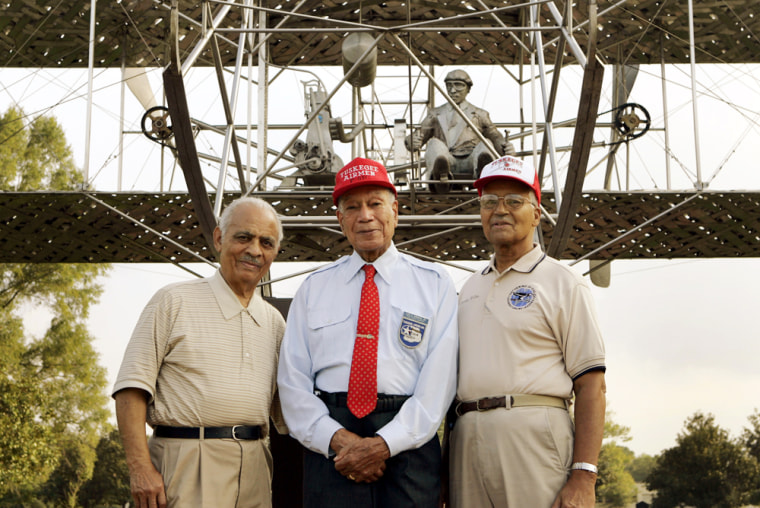Lt. Col. Herbert Carter is 86 years old and ready for deployment.
More than 60 years after his World War II tour with the pioneering black pilots known as the Tuskegee Airmen, Carter’s new mission will be shorter, though no less courageous.
Carter is one of seven aging Tuskegee Airmen traveling this weekend to Balad, Iraq — a city ravaged by roadside bombs and insurgent activity — to inspire a younger generation of airmen who carry on the traditions of the storied 332nd Fighter Group.
“I don’t think it hurts to have someone who can empathize with them and offer them encouragement,” he said.
Linking generations
The three-day visit was put together by officials with the U.S. Central Command Air Forces to link the legacy of the Tuskegee Airmen with a new generation.
“This group represents the linkage between the ‘greatest generation’ of airmen and the ‘latest generation’ of airmen,” said Lt. Gen. Walter Buchanan III, commander of the Air Forces command, in an e-mail to The Associated Press.
The retired Airmen who will make the trip — five pilots, a mechanic and a supply officer — shrugged off the dangers of Iraq, saying they have stared down the enemy before. Some fought in Korea and Vietnam as well as World War II.
Current members of the 332nd, redesignated as the 332nd Air Expeditionary Group in 1998, include men and women of different backgrounds and races.
But the black retirees said they are thrilled that a group still fights within their 332nd lineage, regardless of skin color.
“I’m proud they’re in a unit carrying our name,” said Charles McGee, 82, a retired colonel whose 409 combat missions is an Air Force record. “That’s very meaningful from the heritage point of view.”
Second-class citizenship
The original Tuskegee Airmen were recruited in an Army Air Corps program created to train blacks to fly and maintain combat aircraft during World War II — though some of the retired Airmen say it was really designed to try to prove that blacks were incapable of flying and fighting.
Even after the first group completed pilot training in March 1942, they were not allowed to fly for more than a year.
“My status as a Negro bordered on second-class citizenship and the military simply reflected the culture of the time,” Carter recalled in a recent interview. “If you were a Negro, you were a Negro in either setting.”
Eventually, the black airmen flew escort for bombers. They were credited with shooting down more than 100 enemy aircraft and never losing an American bomber under escort to enemy fighters. In all, 992 pilots were trained in Tuskegee from 1940 to 1946. About 450 deployed overseas and 150 lost their lives in training or combat.
The trip to Iraq brings new recognition to the trailblazing team celebrated in a 1995 HBO movie, “The Tuskegee Airmen.”
Passing on their stories
Maj. Anthony Robinson of Shaw Air Force Base, S.C., who spearheaded the trip for the seven, said the group in Iraq is looking forward to hearing the Tuskegee Airmen’s stories.
Only about 100 Tuskegee Airmen are still living. Several surviving members said they would make the trip to Iraq if health issues did not stand in their way.
They said they would continue to speak to current units, schools and public officials to ensure their legacy stays alive years after they are gone.
“I think everything should be done to pass their story to future generation of Americans,” said Ted Johnson, 80, who graduated from the Advanced Flight School in 1945 and is considered one of the youngest Tuskegee Airmen.
“It was the Tuskegee Airmen who made America come to its senses,” he said, “that individuals should be judged on their accomplishments, rather than their ethnicity and color.”
